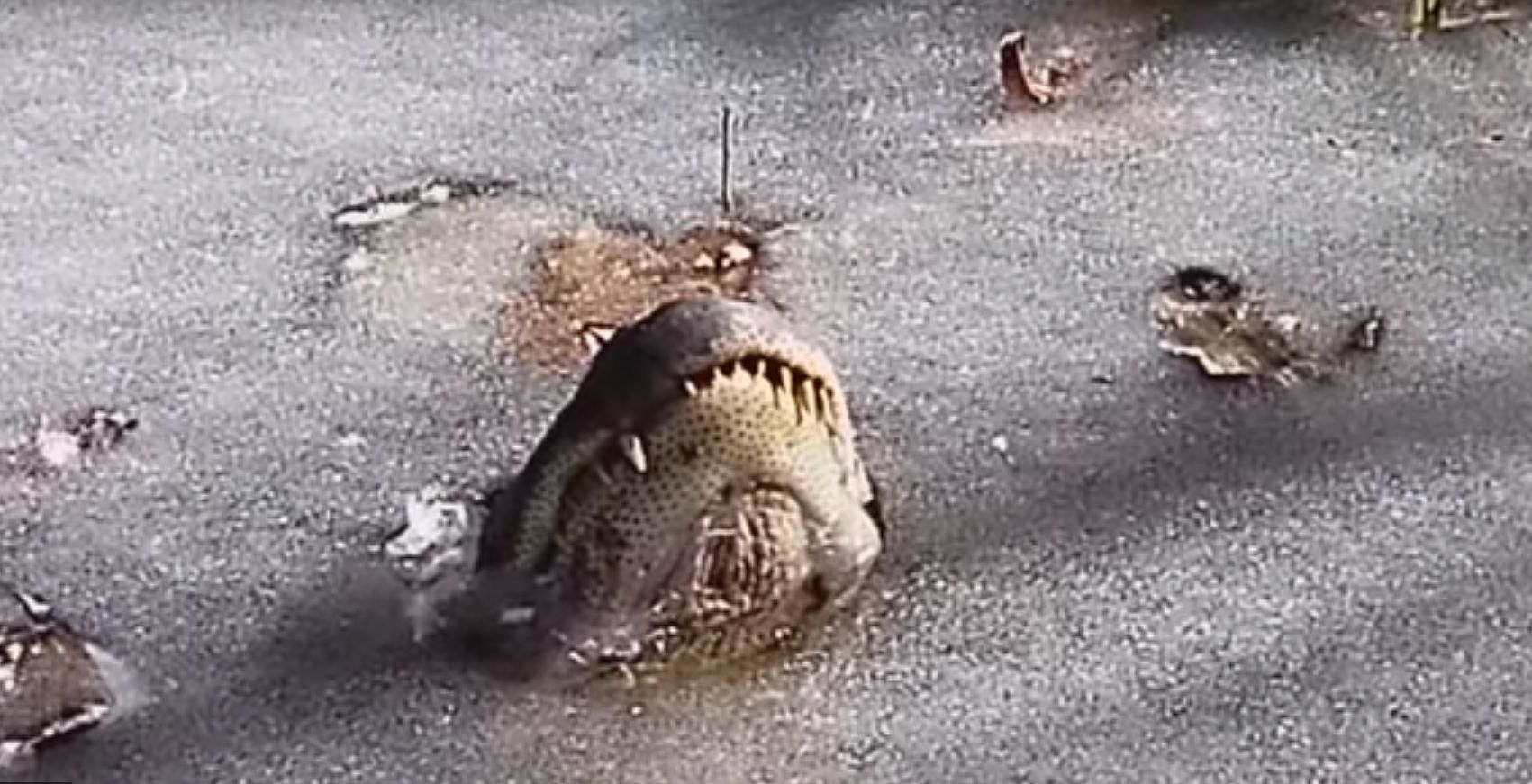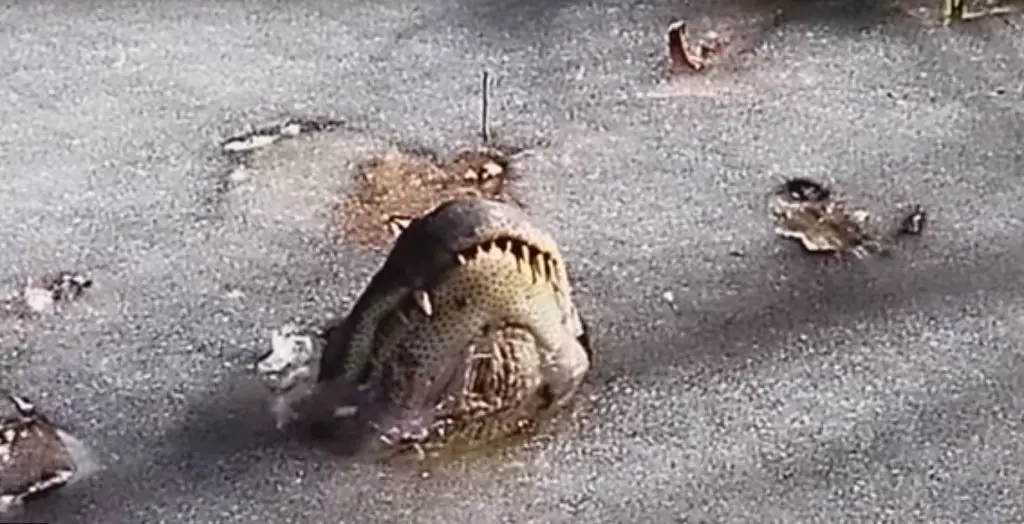Alligators are fascinating creatures that have roamed the Earth for millions of years. These large reptiles can grow up to 14 feet long and weigh over 1,000 pounds, making them one of the largest predators in their environment. But have you ever wondered what alligators do during the winter months?
Contrary to popular belief, alligators do not hibernate during the winter like some other animals. Instead, they have a few different strategies to survive the colder temperatures and changes in their environment. In this article, we will explore the winter habits of alligators and how they adapt to the changing seasons.
Alligators are cold-blooded reptiles that slow down their metabolism in the winter. They become less active and may even stop eating altogether. They often move to warmer areas, such as burrows or bodies of water that are heated by the sun. Alligators can survive freezing temperatures by sticking their snout above the water’s surface and breathing through a hole in the ice. However, if the winter is exceptionally harsh, some alligators may not survive.

What Do Alligators Do in the Winter?
Alligators are fascinating creatures that are native to the southeastern United States. These reptiles are well-known for their intimidating appearance and their ability to survive in some of the harshest environments on earth. However, many people are curious about what alligators do during the winter months when the weather turns cold. In this article, we will explore the different ways that alligators adapt to the changing seasons.
Surviving the Cold
Alligators are cold-blooded creatures, which means that their body temperature is regulated by their environment. When the temperature drops, alligators become lethargic and their metabolism slows down. This allows them to conserve energy and survive the cold weather.
During the winter months, alligators will often hibernate in burrows or dens that they have dug out themselves. These burrows are usually located near water sources and provide a warm and secure environment for the alligator to wait out the cold weather.
Feeding Habits
During the winter months, alligators do not eat as much as they do during the warmer months. This is because their metabolism slows down and they do not require as much food to sustain themselves.
However, alligators are opportunistic feeders and will eat whenever the opportunity presents itself. This means that if the weather warms up for a few days, alligators may venture out of their dens and search for food.
Mating Season
Alligators typically mate during the spring months, but the breeding season actually begins in the winter. Male alligators will begin to make bellowing calls to attract females, and they will also engage in physical displays to establish dominance over other males.
During the winter months, female alligators will begin to prepare their nests for the upcoming breeding season. They will construct a nest out of vegetation and mud and lay their eggs inside. The eggs will then hatch in the spring when the weather warms up.
Behavioral Adaptations
Alligators are well-adapted to their environment and have developed a number of behavioral adaptations to help them survive in the winter. For example, they have a special valve in their throat that allows them to hold their breath for extended periods of time. This allows them to remain submerged in water for longer periods of time and avoid exposure to the cold air.
Additionally, alligators have a thick layer of fat under their skin that helps to insulate them from the cold. This layer of fat also provides them with energy reserves that they can draw on during times of food scarcity.
Benefits of Hibernation
Hibernation is an important survival strategy for alligators during the winter months. By slowing down their metabolism and conserving energy, alligators are able to survive the cold weather and emerge in the spring healthy and ready to mate.
Additionally, hibernation allows alligators to avoid exposure to the cold and reduce their risk of illness and injury. By staying in their dens, alligators are protected from predators and harsh weather conditions.
Alligators vs. Crocodiles
Many people confuse alligators with crocodiles, but there are some key differences between these two types of reptiles. One of the main differences is their habitat. Alligators are found in fresh water environments, while crocodiles are found in saltwater environments.
Additionally, alligators have a wider and shorter snout than crocodiles. This helps to distinguish them and also allows them to exert more force when biting down on their prey.
Alligator Conservation
Alligators were once hunted to near extinction, but conservation efforts have helped to increase their population in recent years. Alligators are now protected by state and federal laws, and their habitat is being preserved to ensure their survival.
If you encounter an alligator in the wild, it is important to remember that they are wild animals and should be treated with respect. Keep a safe distance and do not attempt to feed or touch them.
Conclusion
In conclusion, alligators are fascinating creatures that have adapted to survive in some of the harshest environments on earth. During the winter months, alligators hibernate in burrows and slow down their metabolism to conserve energy. They also engage in mating behaviors and prepare their nests for the upcoming breeding season.
Alligators are an important part of the ecosystem and play a crucial role in maintaining the balance of their habitat. By understanding their behavior and habitat requirements, we can help to ensure their survival for generations to come.
Frequently Asked Questions
Learn more about alligators and their behavior during the winter season.
Do alligators hibernate during the winter?
No, alligators do not hibernate during the winter. However, they do become less active and will spend more time basking in the sun to regulate their body temperature. Alligators can also slow down their metabolism in colder temperatures, allowing them to survive with less food.
They may also dig burrows in the mud near water sources to stay warm and avoid freezing temperatures. Alligators are cold-blooded reptiles and their body temperature is dependent on the environment around them.
What do alligators eat during the winter?
Alligators may eat less during the winter, as their metabolism slows down. However, they are opportunistic feeders and will eat any available prey, including fish, birds, turtles, and mammals. Alligators may also scavenge for carrion during the winter months.
It’s important to note that feeding alligators, especially during the winter, is illegal and dangerous. Feeding alligators can lead to them becoming less afraid of humans and more aggressive, which can result in dangerous situations for both humans and alligators.
How do alligators survive in colder temperatures?
Alligators have adaptations that allow them to survive in colder temperatures. They can slow down their metabolism, allowing them to conserve energy and survive with less food. Alligators also have a thick layer of insulating fat under their skin that helps them retain body heat.
Alligators also have the ability to move between warmer and colder environments, allowing them to regulate their body temperature. They may move into deeper water or burrows during colder temperatures and bask in the sun during warmer temperatures.
Do alligators migrate during the winter?
No, alligators do not migrate during the winter. They may move to deeper water or burrows to avoid freezing temperatures, but they do not travel long distances to escape the cold.
Alligators are adapted to living in their specific habitats and have evolved to survive in a range of temperatures and environments. They are highly territorial and will stay within their designated area throughout the year.
When do alligators become active again after winter?
Alligators become more active in the spring when temperatures begin to warm up. They will bask in the sun more frequently and may begin to feed more actively. However, the exact timing of when alligators become active again can vary depending on their location and local climate.
It’s important to remember that alligators are wild animals and should be treated with caution and respect at all times, regardless of the time of year.
Do alligators hibernate? | Natural History Museum
In conclusion, alligators have a unique way of surviving the cold winter months. They become less active and may even enter a state of brumation, where their metabolism slows down. They seek out warmer areas such as deep water, mud, or underground dens to wait out the cold weather.
Despite their ability to survive the winter, alligators can still face challenges such as habitat loss and human interference. It’s important for us to continue to protect their habitats and respect their space to ensure their survival in the future.
Overall, alligators may not be the first animal that comes to mind when thinking about winter survival, but they have adapted in their own way to thrive in colder temperatures. Their impressive ability to endure the winter is just another reason why they are such fascinating creatures to observe and admire.


